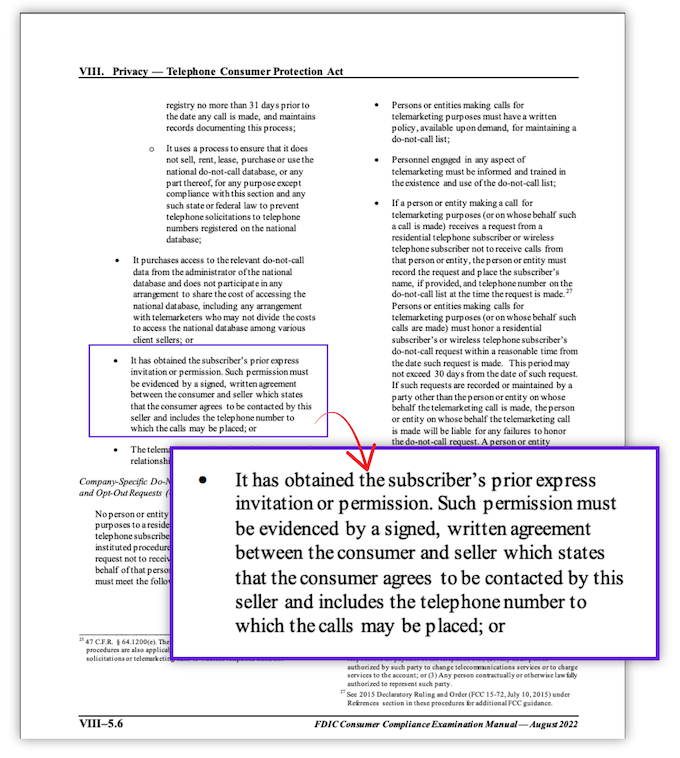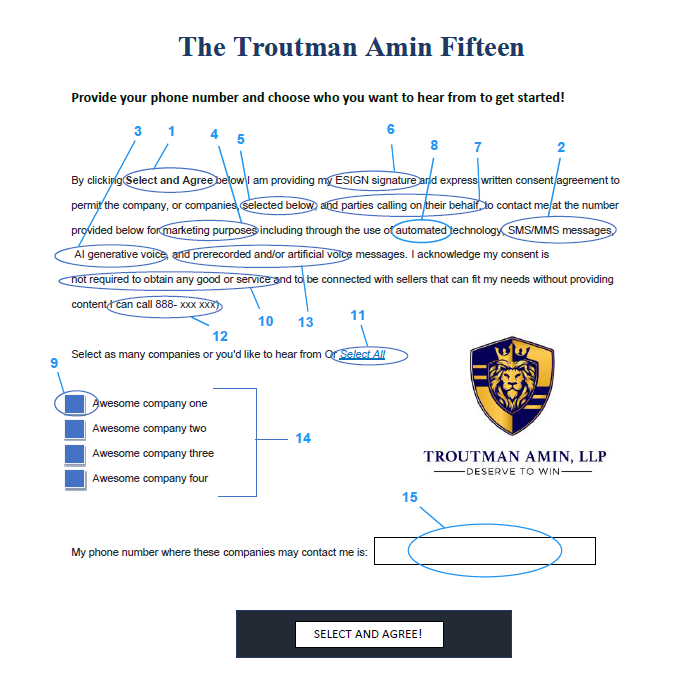The complete TCPA express written consent checklist

In the world of digital marketing, talking to your customers is key. But with great power comes great responsibility. You have to follow a number of rules to make sure you’re communicating with your customers in a way that’s safe and respects their privacy.
One of the big ones is the Telephone Consumer Protection Act (TCPA). The TCPA is all about telemarketing, and it covers things like automated calls and text messages. To make sure you’re playing by the rules, the TCPA says you need to get express written consent from your customers before you can start making these kinds of marketing communications.
In this post, we’re going to break down what express written consent is, why it’s important, and how you can get and manage it the right way. Stick to the plan, and you’ll be in good shape to keep your customers happy and your business in the clear.
What is prior express written consent?
Remember the days when your phone would ring with calls from numbers you didn’t recognize, maybe during dinner or even in the middle of the night? Or that time you received an unsolicited text message from a company you had never heard of? If you answered yes to either of these questions, you may have been on the receiving end of a marketing message sent in violation of the TCPA.
The TCPA, which was enacted in 1991 by the Federal Communications Commission (FCC), was designed to protect consumers from unwanted phone calls and text messages by placing restrictions on businesses. Failure to comply with these restrictions can lead to severe legal repercussions for companies, including fines and lawsuits.
The cornerstone of TCPA compliance is the principle of “express written consent.” Here’s the express written consent’s definition: “A signed, written agreement between the consumer and seller, which states that the consumer agrees to be contacted by this seller and includes the telephone number to which the calls may be placed.”

This permission must specify the phone number to be called and requires to obtain the recipient’s written or electronic signature. This could be a signed document or a simple press of a button to affirm the agreement. It is also necessary to disclose that giving consent is not a condition of purchase.
Why you need to obtain prior express written consent for marketing calls and texts
The TCPA is a federal law that governs telemarketing calls and text messages. A fundamental requirement of the TCPA is that businesses secure consent from consumers before sending them marketing messages.
This type of consent is explicit, written, and signed by the consumer, and it must be accompanied by a clear and conspicuous notice of the consumer’s right to revoke consent at any time.
Consumer consent can be acquired through various means, such as online forms, physical documents, and even text messages. To ensure compliance with the TCPA, businesses need a robust system in place to obtain and manage consent from consumers.
Failing to comply with the TCPA can lead to significant legal and financial consequences. Here are the main repercussions.
Statutory damages
Violators can be held liable for statutory damages. The TCPA allows individuals to sue for $500 per violation. If the court finds that the violations were willful or knowing, it can triple the amount to $1,500 per violation.
Class action lawsuits
Non-compliance can result in class action lawsuits, where a group of consumers who have received unsolicited calls or messages can sue collectively. This can multiply the potential damages exponentially, leading to multi-million dollar settlements or judgments.
Regulatory fines
The FCC can impose fines for TCPA violations. These fines can be substantial, particularly for large-scale or egregious violations.
Injunctive relief
Courts may issue injunctions to prevent ongoing or future violations, which can include orders to cease certain practices or implement compliance measures.
Reputational damage
Beyond financial penalties, non-compliance can lead to negative publicity and damage to a company’s reputation, impacting customer trust and business relationships.
Operational impact
Legal actions and regulatory scrutiny can disrupt business operations, requiring significant time and resources to address the issues and implement corrective measures.
To avoid these consequences, businesses should ensure they have robust compliance programs in place, including obtaining proper consent before making calls or sending messages, maintaining accurate records, and regularly training employees on TCPA requirements.
TCPA prior express written consent requirements
As of today, in order to comply with the TCPA, consent must:
- Be documented. This means the consumer’s agreement must be captured in writing, either on paper or in an electronic format that can be stored and retrieved.
- Be clear and conspicuous. The consumer must be able to easily understand that they are giving their consent to be contacted.
- Clearly state that the consumer has the right to revoke their consent. You must make undeniably clear that the consumer has the right to change their mind and withdraw their consent at any time and with any reasonable mean.
- Be obtained before sending the message. You, as a business, need to get the green light from the consumer before you hit send on any marketing messages.
Starting January 27, 2025, new requirements under the TCPA will come into effect. These changes are primarily aimed at tightening the consent requirements for telemarketing calls and texts. Here are the key updates:
- One-to-one consent: The new rules require that consent must be obtained on a one-to-one basis. This means a consumer’s consent must specifically authorize communication from a single identified seller, rather than allowing blanket consent for multiple sellers or “marketing partners” as was previously allowed.
- Contextual relevance: Marketing calls and texts must be logically and topically associated with the context in which the consumer provided consent. For instance, if a consumer provides consent on a car loan comparison website, this consent cannot be used for marketing unrelated products like loan consolidation.
- Do Not Call (DNC) registry: The FCC has codified that the National DNC registry protections apply to text messages as well as calls. This reinforces the restriction against telemarketing calls and texts to numbers listed on the DNC registry.
- Text message blocking: Wireless carriers will be required to block text messages from specific numbers identified by the FCC as sources of illegal texts. This measure aims to curb spam and fraudulent messages.
These changes are intended to close loopholes that allow lead generators and comparison-shopping sites to collect broad consents, ensuring consumers have more control over who contacts them and for what purposes.
Businesses must update their consent mechanisms to comply with these new regulations to avoid significant penalties and legal challenges. Therefore, a system to manage prior express written consent is a must. This system should include:
- A method to record when and how consent was given.
- A method to securely store the consent records.
- A way to easily retrieve the consent records as needed.
Remember, securing consent is a powerful way to minimize the risk of TCPA infractions and safeguard your business.
How to obtain and store prior express written consent
ActiveProspect offers an easy way to help you obtain and store proof of consent: TrustedForm, the ultimate compliance solution for documenting TCPA consent on digital lead capture forms.
First, TrustedForm Certify helps you capture proof of consent by documenting exactly when and where consent was obtained throughout a lead capture event, with an easily accessible session replay.
Then, you can store and access this documentation of consent through TrustedForm Retain, which holds certificates and makes them available for up to five years.
Certifying leads with TrustedForm is easy! All you have to do is:
- Sign up for a free ActiveProspect account.
- Copy the TrustedForm web SDK javascript snippet.
- Paste it to your web forms.
TrustedForm will start capturing lead consent right away! Watch this short video to see how TrustedForm works.
Best practices for obtaining and managing prior express written consent
To ensure you meet the regulatory requirements, consider implementing the following best practices:
- Prominently disclose the consent request: Ensure that the request for consent is easy to spot and not buried in fine print. Use language that’s crystal clear, avoiding jargon or confusion, and present the request in a way that stands out from other information.
- Provide a clear and concise explanation: Explain what kind of messages a person will receive if they opt in. Will they get promotional offers, updates, or reminders? And if so, how often can they expect to hear from you?
- Offer an easy opt-out mechanism: Make sure your customers can easily opt out of your messages. Offer clear instructions on how to do so, such as by replying with “STOP” or “UNSUBSCRIBE” or by visiting a specific webpage.
- Maintain thorough records: Keep meticulous logs and records of all consent you’ve gathered. These should include the date and time of consent, the specific communication channel used (be it SMS or phone call), the content of the consent request, and the consumer’s response. Hang onto these records for a reasonable period as evidence of your compliance.
- Train your staff: Make sure your staff who engage with customers are well-versed in TCPA regulations and the importance of securing prior express written consent. Equip them with the right procedures for requesting and documenting consent to avoid any missteps.
TCPA express written consent example
Eric J. Troutman of the Troutman Amin, LLP and TCPAWorld.com offers a great TCPA express written consent example with his “Troutman Amin Fifteen” template.

Eric J. Troutman outlines that adhering to these 15 requirements when gathering consent will help you stay compliant with the law:
- The disclosure must mention the language used on the button.
- The disclosure must state if SMS/MMS will be utilized in the campaign.
- The disclosure must mention the use of AI-generated voice if applicable.
- The disclosure must reference marketing activities.
- The disclosure must be positioned above the selection of companies and the acceptance button.
- The disclosure must refer to the ESIGN Act.
- The disclosure must inform that companies may make calls on behalf of the seller.
- The disclosure must mention the use of automated technology.
- The disclosure must permit consumers to individually select goods/service providers;
- The disclosure must clarify that consent is not required to purchase any goods/services/credit.
- A small “select all” option may be included but should not be mandatory.
- Consumers must be able to access services without giving consent.
- The disclosure must include information on prerecorded or artificial voice messages, if used.
- Only a reasonable number of companies should be presented to the consumer.
- The phone number must be provided on the same page where consent is given.
Additionally, the calls must be directly related to the transaction that resulted in the consumer giving consent. Therefore, a consumer’s agreement to hear from a company for one specific purpose does not imply consent for all types of contact.
Final thoughts
TCPA is not a joke and making sure you’re properly getting prior express written consent before contacting consumers is going to protect you from getting involved into nasty and costly lawsuits.
By adopting the best practices listed above and utilizing a dependable consent management system like TrustedForm, you can successfully obtain and oversee consumer consent, reducing the likelihood of TCPA infractions and fostering trust with your customers.

DISCLAIMER: This page and all related links are provided for general informational and educational purposes only and are not legal advice. ActiveProspect does not warrant or guarantee this information will provide you with legal protection or compliance. Please consult with your legal counsel for legal and compliance advice. You are responsible for using any ActiveProspect Services in a legally compliant manner pursuant to ActiveProspect’s Terms of Service. Any quotes contained herein belong to the person(s) quoted and do not necessarily represent the views and/or opinions of ActiveProspect.





